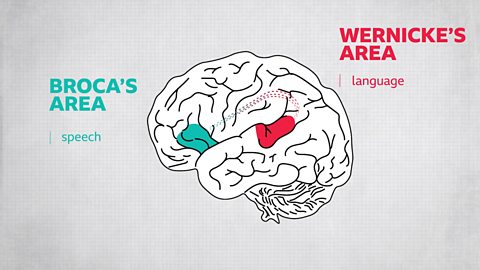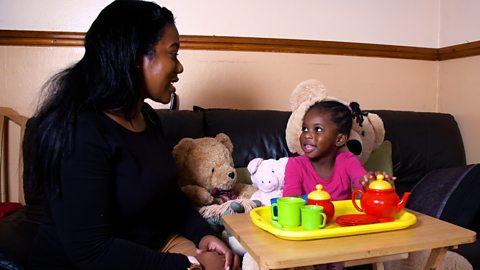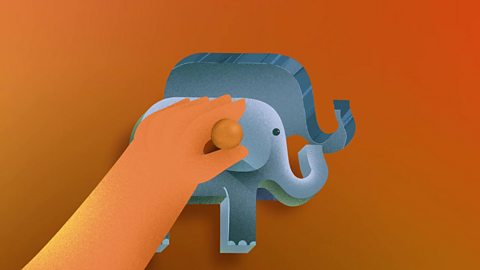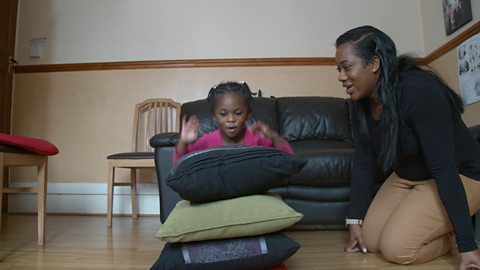Working out the rules of language is tough when you're little. Lots of toddlers make mistakes when they first start talking.
But what's the best way to help toddlers say words properly?
Watch Dr Saloni Krishnan help a family find out with a little experiment in our Speech Lab, exploring how subtly correcting words when repeating them back to children can help their speech in future.
Saloni
Figuring out how to put words together to make a sentence is hard and it's totally normal for your toddler to get words wrong or mixed up. So what's the best way to help your toddler get their words right? To find out, we're going to investigate what happens to your child's language development when you repeat their words back to them in the right way.
How old is little Lilah? Two, wow! Does Lilah struggle with any words?
Keaton
She's talking really well for her age, but she does struggle with plurals a little bit. For example, she'd say two foots instead of feet.
That's really common at her age. So to see if we can help Lilah use the right words and sentences, we're going to use a technique called recasting. First, let's see what Lilah says when she looks at these cards and you don't repeat the word back to her correctly.
Keaton
What's that?
Lilah
- A foot.
Keaton
A foot. So that's?
Lilah
Two foots.
Keaton
- Two foots? Okay. And, what's that?
Lilah
A sheep.
Keaton
- A sheep. What's that?
Lilah
Two sheeps.
Keaton
- Two sheeps.
Saloni
So this time you can say the word back to her correctly.
Keaton
What's that?
Lilah
A foot.
Keaton
- A foot. So that's?
Lilah
- Two foots.
Keaton
Two feet, good girl. What's that?
Lilah
A mouse.
Keaton
That's a mouse, good. And what's that?
Lilah
Two mouses.
Keaton
Two mice. You say two mice? So what's that?
Lilah
That's – Two mice
Keaton
Yes, two mice, good girl. Well done Lilah.
Saloni
Recasting might not seem to make a difference straight away, but Lilah's actually taking in everything you say. A toddler's brain uses up to 40 percent of their energy, which is almost double what an adult uses. This is because their brains are busy reorganising all the connections between brain cells and building neural superhighways. These superhighways connect important parts of the brain together, like Broca's and Wernicke's area, which are linked to speech and language. Studies show that by recasting your toddler's words back to them, you can show them the right way to use language. And this can help their brain to strengthen their superhighway connections more quickly. You can recast your child's words any time. Around the house when
What is recasting and how does it make a difference?
Recasting is when you repeat what your child says back to them, in a sentence and using the correct words, no matter what mistakes they may have made. A common one is saying plurals incorrectly - 'sheeps' instead of 'sheep', or 'foots' instead of 'feet'.
If you were to say to your child 'where do your socks go?' and they respond 'foots', you would say 'yes, that's right they go on your feet', with a big smile and plenty of encouragement.
This way you don't draw attention to their mistake and make them feel bad for getting it wrong. Instead you just simply let them hear it said correctly.
Over time, the more they hear the correct words, the more likely they will be to get it right in future and be able to build more complex sentences.
It usually takes time to see the difference made by recasting your child's words - though when Lilah's parents started saying words back to her with corrections, she soon said 'mice' instead of 'mouses'.

What is happening in your child's brain?
Toddlers brains are often using far more of their energy than adult brains do - often up to 40%.
They are constantly making neural connections and reorganising connections between their brain cells. They are building superhighways between important parts of their brains like Broca's area (which is responsible for making speech sounds) and Wernicke's area (which is responsible for helping us to understand words).
The more they hear words being said correctly, the more they'll link these word sounds with the words they're making, as the link between these two areas of the brain is strengthened.

More about recasting
There's more information on recasting across the Tiny Happy People site.






